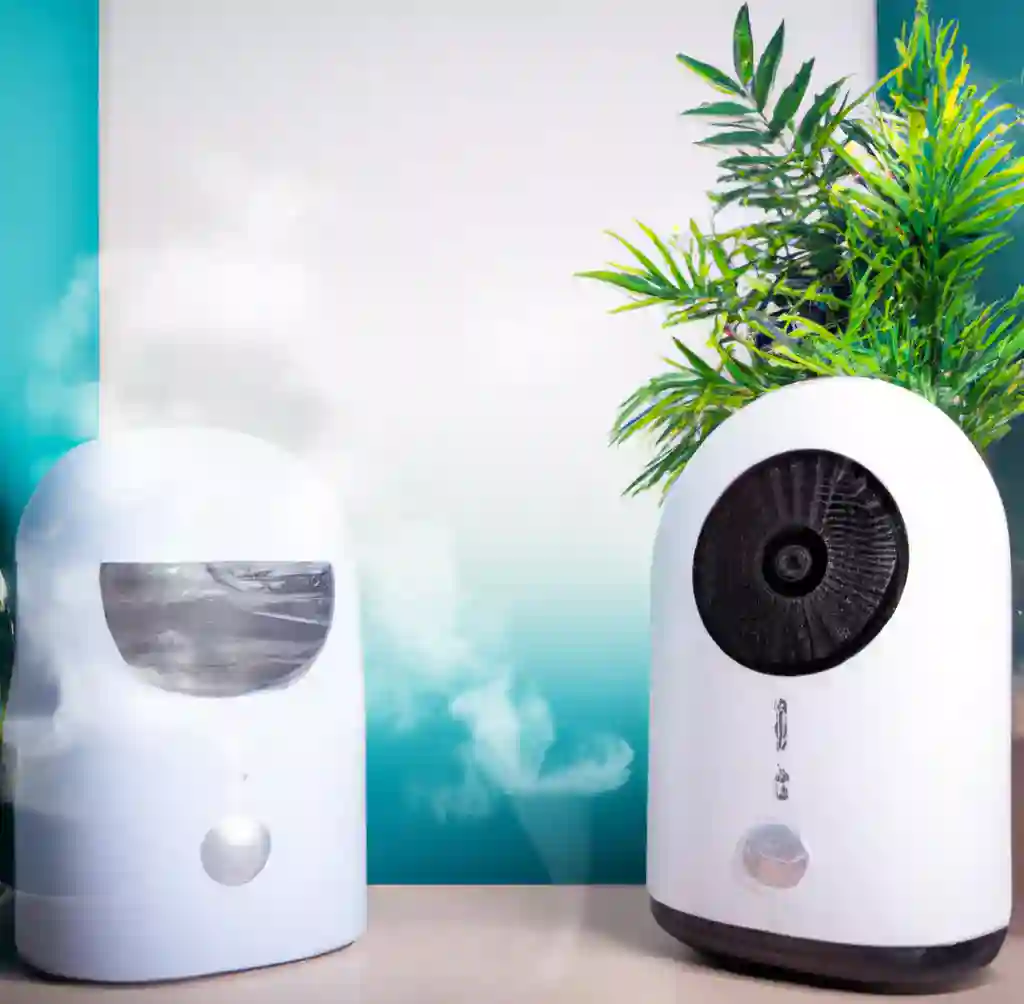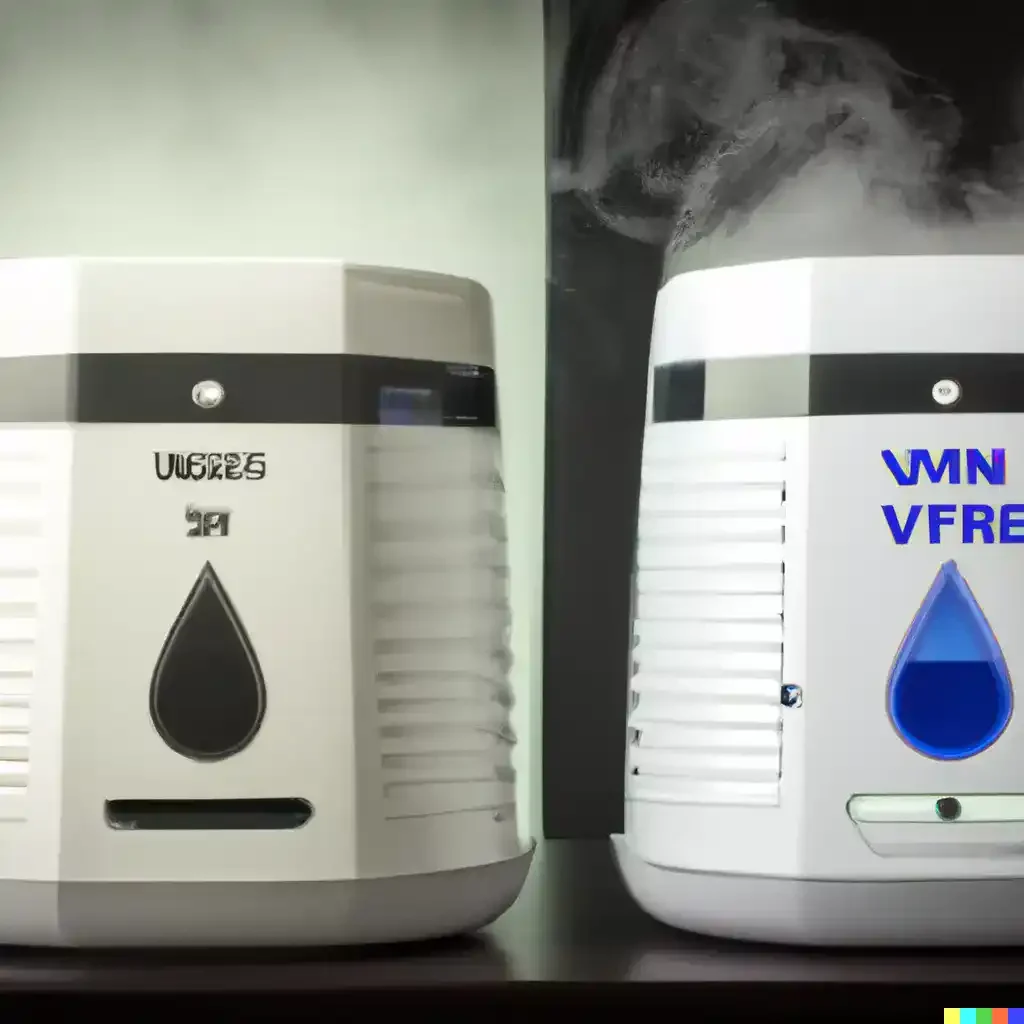Air purifier Vs humidifier! Let’s find out which one is best for you.
An air purifier is a device that is used to remove contaminants and pollutants from the air in a room or an area. It works by drawing in air from the surrounding environment, filtering out the pollutants and contaminants, and releasing clean air back into the room.
There are various types of air purifiers available on the market, and they can be effective at removing a wide range of pollutants, including dust, mold, smoke, allergens, and bacteria.
A humidifier, on the other hand, is a device that is used to add moisture to the air. It works by releasing water vapor into the air, which increases the humidity levels in a room or an area.
Humidifiers can be particularly helpful in dry environments or during the winter months when indoor air tends to be dry. Increasing the humidity in a room can help to alleviate dryness in the nose and throat, improve the health of plants, and make the air feel more comfortable to breathe.
In summary, an air purifier is designed to remove pollutants from the air, while a humidifier is designed to add moisture to the air.
Both can be useful in different situations, and you may find that using both an air purifier and a humidifier together can help to improve the air quality and comfort in your home.
Comparison of Air Purifier and Humidifier
Here is a comparison of air purifiers and humidifiers:
Purpose:
- Air purifier: Removes pollutants and contaminants from the air
- Humidifier: Adds moisture to the air
Types:
- Air purifiers: There are several types of air purifiers available, including mechanical filters, activated carbon filters, ozone generators, and ultraviolet (UV) light purifiers.
- Humidifier: There are several types of humidifiers available, including cool mist, warm mist, ultrasonic, and evaporative humidifiers.
Effectiveness:
- Air purifier: The effectiveness of an air purifier depends on the type of pollutants it is designed to remove, as well as the size of the room and the airflow. In general, air purifiers can be effective at removing a wide range of pollutants, including dust, mold, smoke, allergens, and bacteria.
- Humidifier: The effectiveness of a humidifier depends on the type of humidifier and the humidity levels in the room. In general, humidifiers can be effective at increasing the humidity levels in a room, which can help to alleviate dryness in the nose and throat, improve the health of plants, and make the air feel more comfortable to breathe.
Maintenance:
- Air purifier: Regular maintenance is required for air purifiers, including replacing the filters and cleaning the device.
- Humidifier: Regular maintenance is required for humidifiers, including cleaning the device and refilling the water tank.
In summary, air purifiers and humidifiers serve different purposes and have different types, effectiveness, and maintenance requirements. An air purifier is designed to remove pollutants from the air, while a humidifier is designed to add moisture to the air.
You may find that using both an air purifier and a humidifier together can help to improve the air quality and comfort in your home.
Pros And Cons of Air Purifiers and Humidifiers
Here are some pros and cons of using air purifiers:
Pros:
- Can improve indoor air quality by removing pollutants and contaminants from the air
- Can help to alleviate allergy and asthma symptoms by reducing the presence of allergens and other irritants in the air
- Can help to reduce the risk of respiratory infections by removing bacteria and other pathogens from the air
- Can improve the overall health and well-being of the people living in the space
Cons:
- May be expensive to purchase and maintain
- May produce noise while in operation
- May require regular maintenance, such as replacing filters and cleaning the device
- May not be effective at removing certain types of pollutants, such as gases and odors
Here are some pros and cons of using humidifiers:
Pros:
- Can increase humidity levels in a room or an area, which can help to alleviate dryness in the nose and throat, improve the health of plants, and make the air feel more comfortable to breathe
- Can help to reduce the risk of respiratory infections by increasing the humidity in the air, which can inhibit the growth and spread of bacteria and other pathogens
- Can be beneficial in dry environments or during the winter months when indoor air tends to be dry
- Can be relatively inexpensive to purchase and maintain
Cons:
- May require regular maintenance, such as cleaning the device and refilling the water tank
- May produce noise while in operation
- May be less effective in large or poorly insulated rooms
- May contribute to the growth of mold and bacteria if not used and maintained properly
In summary, both air purifiers and humidifiers can have benefits and drawbacks, depending on the specific situation and the needs of the user. It is important to consider the pros and cons of each type of device and choose the one that is most suitable for your needs.
You may also find that using both an air purifier and a humidifier together can help to improve the air quality and comfort in your home.
Air Purifier vs Humidifier: Which is Better?
It depends on your specific needs and the conditions in your home.
An air purifier can be beneficial if you have a lot of indoor air pollution, such as dust, pet dander, or smoke. It works by removing these pollutants from the air, which can help improve the air quality in your home and reduce the risk of respiratory problems.
A humidifier, on the other hand, can be helpful if the air in your home is too dry. Dry air can cause a variety of problems, such as dry skin, static electricity, and respiratory issues. A humidifier can help add moisture to the air, which can help alleviate these problems.
Ultimately, whether an air purifier or humidifier is better for you will depend on the specific needs of your home and your health.
If you’re not sure which one to choose, it may be helpful to speak with a healthcare professional or an HVAC specialist to determine the best solution for your needs.
Conclusions: Air Purifier Vs Humidifier
In conclusion, an air purifier is a device that removes pollutants from the air in your home, while a humidifier is a device that adds moisture to the air.
Both can be beneficial in certain situations, but the right choice for you will depend on the specific conditions in your home and your health needs.
If you have a lot of indoor air pollution, such as dust, pet dander, or smoke, an air purifier can help improve the air quality in your home and reduce the risk of respiratory problems.
On the other hand, if the air in your home is too dry, a humidifier can help add moisture to the air, which can help alleviate dry skin, static electricity, and respiratory issues.
Ultimately, the best choice for you will depend on your specific needs and the conditions in your home. If you’re not sure which one to choose, it may be helpful to speak with a healthcare professional or an HVAC specialist to determine the best solution for your needs.
FAQs: Air Purifier Vs Humidifier
Here are some frequently asked questions about air purifiers and humidifiers:
1. What is an air purifier?
An air purifier is a device that removes pollutants, such as dust, pet dander, and smoke, from the air in your home.
2. What is a humidifier?
A humidifier is a device that adds moisture to the air in your home.
3. Which is better for allergies: an air purifier or a humidifier?
An air purifier can be more effective for reducing allergy symptoms because it removes allergens from the air. However, a humidifier can also be helpful for allergy sufferers because it can help moisturize the nasal passages and make breathing easier.
4. Can an air purifier and a humidifier be used together?
Yes, it is possible to use an air purifier and a humidifier together. In fact, some air purifiers have built-in humidifiers or can be used in conjunction with a separate humidifier.
5. Are air purifiers and humidifiers expensive to run?
The cost of running an air purifier or humidifier will depend on the specific model and the cost of electricity in your area. In general, both types of devices are relatively energy efficient and should not have a significant impact on your energy bills.
6. How often should I replace the filters on my air purifier?
The frequency with which you need to replace the filters on your air purifier will depend on the specific model and the quality of the air in your home. Some air purifiers may require filter changes every few months, while others may only need them once a year.
It’s important to follow the manufacturer’s recommendations for filter changes to ensure that your air purifier is working effectively.





